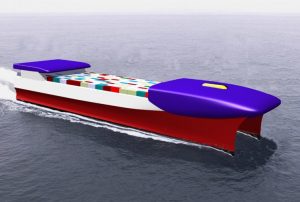
Looking to the future of how shipping can reduce its emissions of greenhouses gases and local pollutants such as NOx and SOx Professor Stephen Turnock spoke at an industry event recently organised by SC Group and chaired by Steve Austen. Other talks addressed the regulatory challenge of reducing emissions and in delivering diesel engines that are IMO Tier III compliant.
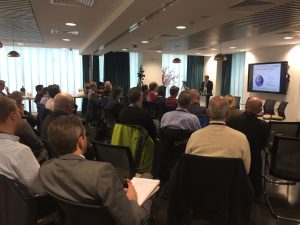
https://proteum.co.uk/videos/
The challenge for today’s ship designers are significant as the future direction of how ships will be powered is not clear. Work at Southampton has considered how best to apply Nuclear technology, possible methods of using hybrid power storage solutions in bulk carriers, and recently on the methods of energy management for hydrogen fuel cells powered vessels.
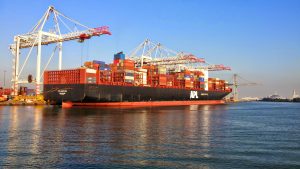
What is clear is that to tackle the problem will allow significant and rapid innovation. will we end in a world where electric motor are the prime units of motive power or will conventional engine technology but with new fuels such as LNG in the short term or Hydrogen in the long term. While the global emissions is an ever present challenge it is often the local air quality health related issues especially in port cities that appears to be driving the need for rapid change.
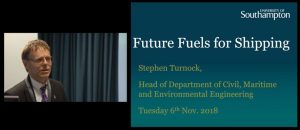
A recent undergraduate project used AIS data for month to evaluate over a month who much emissions of NOx, SOx and particulates were emitted due to all the ship movements within Southampton water. The AIS data allows the time and location as well as the likely amount of emissions to be estimated.
Monthly Archives: December 2018
New ways to move and store water
Access to fresh water is a basic human need and yet in many areas of the world supplies are limited. Work led by by RIFI engineer and FSI PhD graduate Dr Charles Badoe has investigated a new lightweight and collapsible method of storing water within ship tanks.
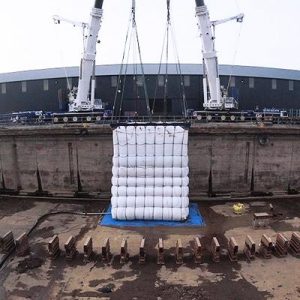
Celebrating 50 years of Ship Science
Its fifty years since the first ship science students enrolled at the University of Southampton and to mark this occasion a two day conference is being organised on 4th/5th April 2019. We would like to invite as many Alumini as possible to attend and to contribute their expertise alongside current staff and students in considering how we shape the future of the maritime industry. To find out more follow this link
https://www.southampton.ac.uk/engineering/research/groups/fsi/future-trends-in-maritime-industry.page
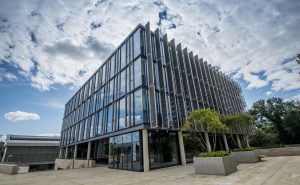
Ship Structures and Beyond
First held in 1961, and there after every three years, the International Ship and Offshore Structures Congress (ISSC) is one of the most prestigious global forums for information exchange by leading experts undertaking and applying marine structural research. This summer ushered in the 20th ISSC held jointly between Liege, Belgium and Amsterdam, the Netherlands in early September. Dr Adam Sobey and Dr Yikun Wang were invited to attend the congress as observers, representing FSI/SMMI and the University of Southampton.
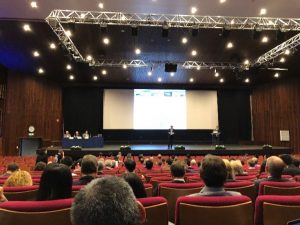
The first day of the congress was held in the Palais des Congrès Liège with with a tour of the experimental facilities at the University of Liège in the afternoon and dinner at the Chateau Colonster, before a second day travelling down the river Meuse with an afternoon visit to the test facilities at the Flanders Hydraulic Research Laboratory and the final two days held in Egmond ann Zee, a small village near the sea in Holland.
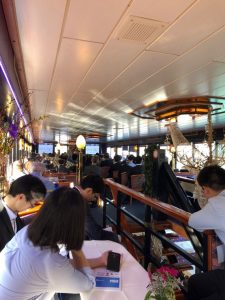
Unique to ISSC, the four-day event was composed of presentations and formal discussions given by eight technical and eight specialist committees. Each committee is formed of a number of multi-national experts from a wide range of marine structure related disciplines from Ultimate Strength to Loads and Environment. Committees have worked over the last three years prior to the congress to generate reports reviewing recent research outcomes, as well as identifying future research areas requiring attention. During the congress, each committee chair has to summarise the report, which is followed by comments given by the official discusser. The chair is required to present responses on behalf of the committee. All comments and responses are captured as part of the ISSC 2018 publications.
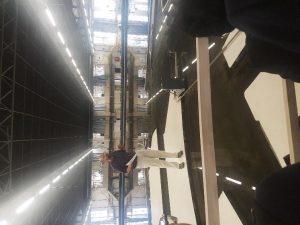
As the first time attending the congress, both Adam and Yikun appreciated the comprehensive reports written by each committee, participated in the professional discussions on relevant research topics and enjoyed networking with experts from universities, research institutes, navy/defence and classification societies. For the next three-year period, Southampton is well represented with Adam on Committee IV.2 – Design Methods, Yikun on Committee III.1 – Ultimate Strength and Dr Blair Thornton on Committee V.8 – Subsea Technology. We look forward to hearing their committee experience in Vancouver 2021!
If you are interested in reading the congress proceedings, please follow this link.
